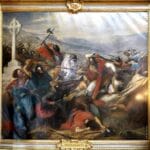Imagine a world where a single decision by a king could shape the destiny of an entire continent. That’s exactly what happened when Clovis I, the King of the Franks, converted to Christianity in 496 AD. This momentous decision wasn’t just a personal religious transformation; it was a strategic power move with far-reaching political and religious consequences that echoed through history.
What is the Significance of Clovis’s Conversion to Christianity?
Clovis I ruled over a collection of Frankish tribes in a time of shifting alliances and religious diversity. By rejecting his pagan roots and embracing Catholicism, Clovis united his people under a single faith, creating a shared identity that strengthened his rule. This conversion had implications beyond the spiritual realm, forging a powerful alliance between the Frankish kingdom and the Roman Catholic Church.
This alliance was a stroke of political genius. The Church, wielding significant influence at the time, provided Clovis with legitimacy and support. He was no longer simply a king; he was a king appointed by God, at least in the eyes of the Church and many of his subjects. This divine backing bolstered his authority and helped him secure his reign.
Moreover, this strategic alliance with the Church had military benefits. Clovis believed his victories on the battlefield were gifts from God, a conviction that bolstered the morale of his troops. This “divine right” to rule and conquer, helped him expand his kingdom and subdue his rivals.
Clovis’s conversion was a turning point in European history. It sparked a wave of Christianization across the continent, with other Germanic tribes following suit, integrating themselves into the burgeoning Christian world. This shift laid the foundation for the dominance of Christianity in Europe for centuries to come, with the long shadow of his decision visible in the enduring presence of Catholicism in France, Germany, and beyond. Three centuries later, Frankish knights, renowned for their audacity and equestrian skills, would carry the banner of Christianity into battle, a testament to the enduring legacy of Clovis’s conversion..
Clovis I’s Conversion: A Turning Point in History?
The year is 496 AD. Clovis I, King of the Franks, makes a momentous decision: he renounces paganism and embraces Catholicism. This wasn’t just a personal religious awakening; it was a calculated move with profound implications for Clovis, his kingdom, and the future of Europe.
Clovis’s conversion to Catholicism was a shrewd political maneuver. The Church, a powerful force in this era, provided legitimacy to his rule, solidifying his position as a divinely appointed king in the eyes of his largely Christian subjects. This newfound religious authority, denied to his pagan predecessors, strengthened his grip on power and bolstered his legitimacy on the battlefield.
Convinced that his military victories were a testament to the Christian God’s favor, Clovis instilled a potent sense of divine backing among his troops. This belief in God’s support fueled their morale and emboldened their conquests, contributing to the expansion of the Frankish kingdom.
The ripple effects of Clovis’s conversion extended far beyond the Frankish borders. His embrace of Christianity set a powerful precedent for other Germanic tribes, inspiring a wave of conversions across Europe. This shift in religious allegiance played a pivotal role in integrating these tribes into the emerging Christian world, forever altering the religious landscape of the continent.
Clovis I’s conversion was not merely a personal religious experience; it was a pivotal moment in history. It reshaped the political landscape, consolidated power, and laid the groundwork for the spread of Christianity throughout Europe, leaving an indelible mark on the course of Western civilization.
The Impact of Clovis I’s Conversion on the Frankish Kingdom
Clovis I’s conversion to Christianity in 496 AD wasn’t just a personal spiritual journey; it was a seismic event that reshaped the Frankish kingdom and sent ripples across the entire European continent. This single decision unified a fractured kingdom, forged a powerful alliance with the Church, and ignited a wave of religious and cultural transformation.
Before Clovis’s conversion, the Franks were a collection of disparate tribes, each with its own customs and beliefs. His embrace of Catholicism provided a unifying force, binding his people under a single faith and creating a shared sense of identity. This newfound religious unity fostered stability and cohesion, making it easier to expand the kingdom’s borders and consolidate power.
The alliance with the Bishop of Rome, cemented through Clovis’s conversion, was a strategic masterstroke. The Church, a major power player in this period, provided Clovis with political legitimacy and the backing of a powerful institution. This relationship, lasting centuries, would lay the groundwork for the future Holy Roman Empire, a testament to the enduring impact of this alliance.
Clovis’s conversion wasn’t just about politics and power; it had profound cultural and religious significance. His decision to embrace Catholicism set a powerful example for other Germanic tribes, encouraging them to convert and join the expanding Christian world. This, in turn, facilitated the spread of education and literacy through the establishment of monasteries, ushering in a new era of intellectual and cultural development in Europe.
While the true motivations behind Clovis’s conversion remain a subject of historical debate, the impact of his decision is undeniable. His conversion to Christianity was a turning point in history, shaping the destiny of the Frankish kingdom and leaving an indelible mark on the religious, political, and cultural landscape of Europe.
How Did Clovis’s Conversion Shape Religious and Political Landscapes?
In the late 5th century AD, Western Europe was a religiously diverse region, with pagan beliefs coexisting alongside the growing influence of Christianity. Clovis I, the ambitious King of the Franks, recognized the transformative power of religion and made a strategic decision that would reshape the political and religious landscape of the continent: he converted to Catholicism.
A King and His Newfound Faith
Clovis I’s conversion to Catholicism in 496 AD had immediate and far-reaching consequences. At a time when Christianity was steadily gaining traction, the King’s embrace of this faith elevated his status from a mere ruler to a divinely appointed leader in the eyes of many. This newfound religious legitimacy, bolstered by the Church’s support, strengthened his grip on power and set a precedent for the fusion of religious and political authority in Europe.
The Power of Unity
Clovis’s conversion had a unifying effect on the Frankish kingdom. By adopting the religion of a significant portion of his subjects, he bridged a cultural divide, creating a shared identity that transcended tribal differences. This newfound sense of religious unity fostered stability and loyalty, strengthening his rule and enabling the expansion of his kingdom.
From Local Ruler to Major Player
Clovis’s conversion to Catholicism had significant geopolitical implications. By aligning himself with the dominant religious force of the time, he gained acceptance among other Christian kingdoms, paving the way for alliances and reducing hostilities. This strategic move allowed him to expand his kingdom’s borders and consolidate his power, transforming the Franks from a regional power into a major player on the European stage.
A Lasting Legacy
Clovis I’s decision to embrace Christianity wasn’t just a personal choice; it was a calculated move that reshaped the political and religious landscape of Europe. His conversion triggered a domino effect, inspiring other Germanic tribes to convert to Christianity, solidifying its dominance in Western Europe. This, in turn, led to the spread of literacy, the preservation of knowledge, and the development of a distinct European Christian culture.
The close relationship between the monarchy and the Church, forged by Clovis, became a model for future rulers, influencing everything from legal systems to social structures. The Holy Roman Empire, a major power in medieval Europe, owed its existence, in part, to Clovis’s decision to convert. Clovis I, the King of the Franks, did more than just unify a kingdom; he shaped the destiny of a continent, leaving an enduring legacy that continues to influence the world today.
- Unlock Filipino Culture: A Deep Dive into Traditions and Practices - April 23, 2025
- Unlock Spanish Culture: Insights & Opportunities Now - April 23, 2025
- White Spirit Uses & Substitutes: A Deep Dive for Pros & DIYers - April 23, 2025
















